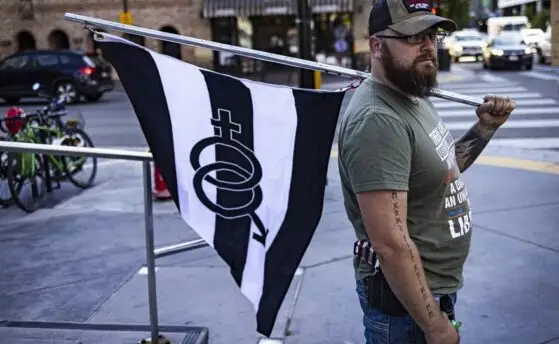Dang it, don’t you hate it when you think of something really cool that you should have said, but you think of it two days too late?
I was just re-reading my column for the Oregon Herald when I thought of another point. How can the Bush Administration be fighting against Oregon’s assisted suicide law when they (and definitely Bush himself) are such supporters of the death penalty (and in Texas, death by lethal injection).
What’s the message there? If you’re a person desperately suffering, wracked with pain from an chronic incurable condition, we can’t allow a doctor to inject a painless poison into your body, but if you’re a heinous criminal, that’s exactly what we’re going to do to you. Sorry, sick person, if you want to end your life in a humane, painless way, you’re going to have to go on a sick serial killing spree or something.
The only difference I can discern is that it’s wrong to allow a person to decide the time and manner of their own demise. It’s OK if God decides it’s your time to die, even to the point where it is OK if we remove your feeding tubes or breathing machines to fulfill God’s wish. It’s also OK if the state decides it’s your time to die. But somehow if you make that decision for yourself, it is a crime.
The other thing I notice is how this is a Judeo-Christian cultural issue. Many other cultures hold the idea of suicide to be a noble thing. I think of some Native American tribes in this instance. When an elder became so old that they became a burden to the tribe, they would take a long, last walk out into the wilderness to become one with the Great Spirit. They would consider it an imposition to consume the tribe’s time, care, and resources once they’d passed a point of usefulness and self-reliance.
This is partially why I wasn’t saddened by the news of Hunter S. Thompson’s suicide. The man had had enough and decided to cash it in. He lived a long, fruitful life — I’d exchange a decade of my life for one year of Thompson’s. The only part that made me sad was that he chose to go in such a horrific, violent manner. There’s no need to put your son through the agony of finding your bloody headless corpse.
Some would argue that the very state of being suicidal is an indicator of mental illness and therefore should be prevented for the individual’s own sake. OK, sure, I can buy that in a large number of cases; certainly Kurt Cobain wasn’t in the best frame of mind when he french-kissed the business end of a shotgun. However, some would have to give me the benefit of the doubt that there are a minority of suicide cases — especially the ones concerning the terminally ill — where suicide is not the result of mental illness but rather logical conclusion.
That’s part of what I really like about Oregon’s law. It has many safeguards. Two independent doctors have to agree on the patient’s decision. There is a long period of counseling. And in ten years, only 174 people have used the law to end their lives. It seems to be working without the abuses and controversy that many of its opponents predicted back in 1994.
I’ve said it before and I’ll say it again: if you do not have absolute sovereignty over your own body, you are not truly free. Oh, if only the Founders would’ve written an absolute right to personal privacy and sovereignty of self into the Constitution. It would’ve solved the issues of abortion, drug use, paparazzi, euthanasia, suicide, and telemarketing with the stroke of a pen.
Yeah, I know, if the courts had been ruling properly on the 4th & 5th Amendments over the years, we’d have a strongly-established right to privacy. I think the Founders’ only mistake was assuming that our rulers would always be as wise and educated as they were. Had they written the Constitution at a 4th-grade reading level (“Church & State shall never mix!”, “You can have a gun as long as you’re in the Militia!”, “Government can’t interfere with your home or your body without a really good reason!”, “Government can’t torture human beings no matter what they did or who they are!”) we might all be better off today.






